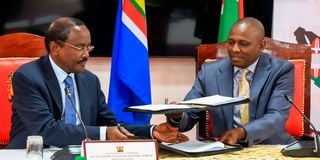
President William Ruto. Political analysts reckon that a vote to change the Constitution could easily be turned into a protest vote against the President’s administration.
| Courtesy | AFPPolitics
Premium
Big dilemma: Why Ruto camp has opposed Azimio referendum call
President William Ruto and opposition leader Raila Odinga are headed for a major clash over calls for a referendum to implement certain recommendations contained in the report by a bipartisan team formed by the two leaders to end months of anti-government street protests.
Allies of President Ruto on Thursday rejected Mr Odinga’s demand for a referendum, saying such an exercise would gobble up billions of taxpayers’ money on top of slowing down Kenya Kwanza’s economic recovery agenda.
The ruling alliance MPs led by UDA secretary-general Cleophas Malala declared that no referendum would take place during President Ruto’s first term in office, even as political analysts reckon that going for a vote to change the Constitution could easily be turned into a protest vote against his administration.
A loss for President Ruto in the event of a referendum would be perceived as a vote of no confidence against his administration and could be exploited to create a momentum for the 2027 General Elections.
Mr Odinga on Wednesday backed the National Dialogue Committee report, but insisted that creation of the offices of the leader of Opposition and Prime Cabinet Secretary would significantly alter the structure of government and would, therefor, require a referendum.

National Dialogue Committee co-chairpersons Kalonzo Musyoka and Kimani Ichung'wah flanked by committee members present their final report at the Hilton Garden Inn on November 25, 2023.
“To create the office of the leader of opposition or to formalise the office of the prime cabinet secretary, the people of Kenya have to have their say by way of a referendum,” said Mr Odinga.
“It is also our stand that this country cannot continue moving forward by being undecided. We have to agree whether we want a parliamentary, presidential or hybrid system,” he added.
Although the report is a product of a joint team formed by President Ruto and Mr Odinga, there is no guarantee that the two political leaders would be on the same side should the country take a vote to amend the 2010 Constitution.
The current scenario mirrors 2005 when the late President Mwai Kibaki, while serving his first term, led the country into a plebiscite. The vote, however, opened a rift in Mr Kibaki’s administration with Mr Odinga, then Roads minister, leading opponents of the proposed new Constitution.
At least 58 per cent of Kenyans rejected the proposed Constitution handing Mr Odinga’s camp a sweet victory over Mr Kibaki’s side, which he used to build momentum to challenge Mr Kibaki in the 2007 polls. The outcome was disputed leading to the formation of the Grand Coalition government.
Mr Malala told the Nation that President Ruto will not allow Mr Odinga to take the country into another Building Bridges Initiative (BBI) circus.
Backed by former President Kenyatta and Mr Odinga, the BBI that proposed multiple constitutional amendments, was adopted by 40 of the 47 counties and garnered two-thirds in both Houses of Parliament, only to be quashed by the courts, including the Supreme Court, to the delight of Dr Ruto who used its failure to propel his 2022 presidential campaign.
In the 2005 referendum, the electoral commission spent Sh4 billion, while in 2010, the country spent Sh10 billion in coming up with the current Constitution.

Wiper party leader Kalonzo Musyoka (left) and National Assembly Majority Leader Kimani Ichung’wah during the signing of the bipartisan talks framework agreement on August 29,2023.
This means that the country would require more than Sh10 billion to conduct another referendum because of inflation and increased number of registered voters.
“Azimio people are living in utopia. We cannot take that route of BBI. The timing is not right and our priority now is on reviving the economy,” said Mr Malala.
Asked if the ruling alliance is scared of the outcome of such a vote, Mr Malala said: “We are not scared of anything, but we are telling the opposition that we are not taking that route.”
Amani National Congress (ANC) deputy party leader Beatrice Adagala and Belgut MP Nelson Koech said a referendum would mean more unnecessary costs that would further overburden Kenyans.
“The clamour for power is real to all those calling for a referendum. We just came from an election after the failed referendum attempt, and Kenyans spoke loudly that issues like a referendum are not a priority. Furthermore, the cost of living being a key agenda, cannot be achieved,” said Ms Adagala, the Vihiga Woman Representative.
Mr Koech accused Mr Odinga of “putting the horse before the cart” on his referendum calls.
“If Azimio is genuine in its quest to support the government in reducing cost of living, it should be the first to demand that we avoid anything that may force Kenyans to incur more expenses,” said Mr Koech.
The NADCO report, Mr Koech noted, is a Parliamentary Committee Report which has to be tabled before Parliament by the majority side to be interrogated by members and relevant experts to determine the way forward.
Kimilili MP Didmus Barasa said Mr Odinga’s plot all along was to box President Ruto’s administration into a corner and lead it to a referendum.
“I said it and I will still repeat that Raila did not have the interest of Kenyans at heart when he agreed to the talks. His aim was to sneak in some populist demands like cost of living and then push for a referendum to try and make this government unpopular ahead of the 2027 elections,” Mr Barasa said.
Similar views were shared by Jubilee Nominated MP Sabina Chege who said the recommendations can be realised through Parliament.

Azimio leaders Raila Odinga (centre), Kalozo Musyoka, Martha Karua (left), Mwangi wa Iria (left) and Wycliffe Oparanya (second right) at Steven Kalonzo Command Centre, Nairobi, on July 4, 2023. Mr Kalonzo will lead the Azimio team in talks with Kenya Kwanza.
“On the issue of a referendum, we have deliberated as a PG and agreed that this is not the right time for it given that the country is grappling with a few challenges. There are other avenues and processes that will be utilised to achieve the recommendations,” Ms Chege said in a press briefing yesterday following a meeting of her Jubilee-led faction.
Analysts believe that Dr Ruto cannot afford to lead the country into a referendum at the moment when his administration is facing heavy criticism due to the current high cost of living occasioned by new taxes.
“Politically, it would put his credibility to lead on the referendum ballot,” University don and political analyst David Monda says.
Also Read:MPs propose creation of 10 new counties
“If he loses the referendum, this will only give more power to the opposition, while making him look weak as President. A referendum right now is also not in his best interests because the public mood is anti-incumbent due to record petrol prices, increased taxes, and multiple corruption allegations,” the professor of political science at the City University of New York adds.
But constitutional lawyer Bobby Mkangi and ODM chairman John Mbadi said some of the recommendations would require a referendum since they will affect the structure of governance.
“Creation of the office of Official Leader of Opposition significantly affects the structure of the primary units that Kenyans created. It would require the voice of the people to change,” said Mr Mkangi.
“It has to be decided by the people, whether it is initiated through the parliamentary route or a popular one, it has to be subjected to a vote by the people,” he explained.
Mr Mbadi said it was not a question of who wants a referendum or not but a requirement of the law.
“Those issues that require a referendum will have to be taken to the people. It is about what the law requires and not the opinion of this party or the other. Maybe they fear the politics around a referendum and the possible outcome and its ramifications,” said Mr Mbadi.
Article 255 of the Constitution states that a ‘proposed amendment to this Constitution shall be enacted in accordance with Article 256 or 257, and approved in accordance with clause (2) by a referendum, if the amendment relates to the supremacy of the Constitution; the territory of Kenya; the sovereignty of the people and the national values and principles of governance.
Other changes that require a referendum include an amendment to the Bill of Rights; the term of office of the President; the independence of the Judiciary and the functions of Parliament and the objects, principles and structure of devolved government.






